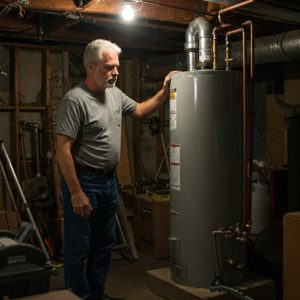HOW DO I KNOW WHEN IT’S TIME TO REPLACE MY WATER HEATER?
How do you know when it’s time to replace your water heater? A water heater that receives regular maintenance and prompt repairs when necessary can last for many years. There’s a good chance the water heater that is currently in your home, is the same water heater that has been installed since you first moved in. Unfortunately, nothing lasts forever. Below are 5 signs its time to replace your water heater.
Age of the Water Heater
Most homeowners are unaware of when a water heater reaches its age limit or that they even have such a short life span. Water Heaters don’t last forever, and most homeowners are shocked when they learn that a water heater typically last between 8-10 Years. While ten is generally the age at which heater replacement is generally recommended, the actual need to replace the water heater could arise before or after this timeline. Whether or not your water heater begins to experience symptoms, you should replace it a decade passed its manufacturer date (this is different from the installation date)
Rusty Water
Water Heaters are made of steel, and when mixed with hot water, the potential of corrosion and rusting is increased over time. Corrosion spreads and can eat through the steel, leading to leaks and debris mixing into your hot water tank. Brown or reddish-brown water coming from your hot water taps is a result of rust and debris coming from your water heater. This is a clear indicator that the inside of the hot water heater is rusting out. Rusting can occur in any water heater, even those between 8-10 years old.
Water Heater Noises
Water heater noises are a possible sign of a water heater reaching its age limit. As your water heater ages, popping, creaking, or rumbling noises, will start emanating louder and louder as the tank heats up water. In households that consume large amounts of hot water, the problem is likely to be even more pronounced once the cause takes hold. Hard water and mineral buildup are also to blame when it comes to water heater noises. The distinct popping water heater noise is caused by minerals forming a layer on the surface of the water heater.
Water Heater Leaks
As your water heater nears the end of its life expectancy, there’s an increased chance of a water leak. Over its life cycle, the inner tank of a water heater is exposed to thousands and thousands of heating cycles resulting in the expansion of the metals in the tank. In many cases a noticeable leak may not always present itself. For example, when the tank is in idle, often there will be no signs of a water leak, but when the metal expands at the height of each heating cycle, a noticeable leak will appear.
Corrosion within the water heater tank can lead to fractures and cracks. If you spot water pooling near or around the water heater, it’s a good indicator that you have a water leak. Depending on the severity of the leak and location of where the water heater is housed, a water leak could result in significant property damage.
Lack of Hot Water
Does it take an unusually long time to get hot water from the tap? Is your shower water lukewarm? These are common signs that your water heater may be failing. What are the causes for loosing hot water in your home?
Most standard water heaters contain a 30-to-50-gallon storage tank. As water flows through your water heater and is heated, natural minerals contained in the water start to separate creating grime and sediment that settle at the bottom of the tank. Over time building a barrier between the burner and the water, reducing the ability to properly heat the water to its desired temperature. Sediment build-up can limit the amount of available water in your tank and reduce water heater efficiency, resulting in running out of hot water or having no hot water at all.
Tips on How to Prolong the Life Expectancy of Your Water Heater
- Maintenance Checks – Perform regular maintenance checks to examine for signs of damage or leaks coming from the tank. Inspect gas and water lines for corrosion or cracks that may result in a water or gas leak.
- Flush the Tank – Getting your water heater flushed every 6 months helps remove debris and sediment buildup inside your water heater.
- Test Pressure-Relief Valve – The pressure relief valve is a built-in safety check for your water heater that releases pressure when it gets too high inside the tank. Check to make sure it is functioning properly.
Creating a maintenance plan with your local plumbing company can keep your water heater running efficiently. A trained water heater professional can also advise you of any repairs needed, ensuring that your water heater is working properly. If you need additional information or would like to schedule a free inspection of your water heater, contact Option One Plumbing today @ 800-905-7115.

